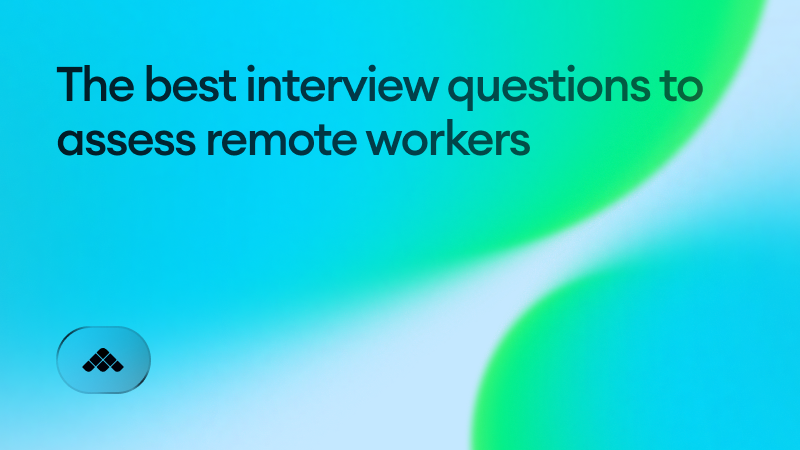Remote work has become an integral part of many organizations. As businesses continue to embrace hybrid or remote work environments, it's crucial to evaluate a candidate's ability to thrive in a remote setting.
Assessing remote work capabilities during the interview process ensures that new hires can maintain productivity, communicate effectively, and adapt to the unique challenges of remote collaboration.
This article provides a comprehensive guide to the best interview questions for evaluating remote work capabilities, insights on what to look for in responses, and tips for effectively assessing these skills during hiring.
What is remote work?
Remote work is a work model where employees perform their jobs outside of a traditional office—often from home, coworking spaces, or anywhere with a reliable internet connection.
Instead of relying on in-person collaboration, remote teams use digital communication, asynchronous workflows, and outcome-based management to stay aligned.
It’s a flexible, largely autonomous way of working that requires strong discipline and intentional communication to succeed.
Which key skills matter for remote workers?
Success in remote roles depends on more than technical ability—remote workers need the discipline, communication habits, and problem-solving skills to thrive without in-person structure. Because collaboration happens across tools, time zones, and communication styles, the people who excel are those who communicate clearly, manage themselves well, and stay connected to team goals.
- Self-management and accountability: Remote workers must be able to organize their work, hit deadlines, and stay productive without constant oversight.
- Clear written communication: Because so much of remote collaboration happens asynchronously, workers need to express ideas, updates, and decisions clearly in writing.
- Proactive communication: Remote teams succeed when people don’t wait for problems to escalate—great remote workers ask questions early, clarify expectations, and keep stakeholders informed.
- Time management and prioritization: Remote employees often juggle flexible hours, distributed schedules, and competing demands, so they need strong prioritization skills to stay on track.
- Comfort with digital tools: Remote work relies on software for collaboration, documentation, and communication; workers must navigate tools confidently and troubleshoot minor issues independently.
- Collaboration across time zones: Asynchronous teamwork requires respect for others’ schedules, thoughtful handoffs, and the ability to move work forward even when teammates are offline.
- Emotional intelligence: Remote settings can make misunderstandings more likely, so EQ helps workers interpret tone, give constructive feedback, and build trust virtually.
- Adaptability and problem-solving: Remote environments shift quickly—great remote workers stay flexible, identify solutions independently, and adapt their workflows when circumstances change.
- Boundary-setting: Without a traditional office structure, remote workers need to set healthy boundaries around working hours and focus time to avoid burnout.
These skills help remote employees stay productive, aligned, and engaged even when they’re miles apart.
Remote work interview questions
Here are the most common and valuable interview questions to assess a candidate's remote work capabilities.
- How do you stay organized and manage your time when working remotely?
- What tools and technologies do you use to facilitate remote collaboration?
- How do you handle communication and ensure clarity when working with a remote team?
- Can you describe your previous experience with remote work?
- How do you maintain work-life balance in a remote work environment?
- What strategies do you use to stay motivated and productive without direct supervision?
- How do you ensure you are aligned with team goals and company objectives while working remotely?
- How do you handle interruptions or distractions in your remote workspace?
- What steps do you take to continue your professional development while working remotely?
What to look for in answers
- Remote work experience: Look for candidates who have a solid background in remote work environments and can articulate their specific roles and responsibilities.
- Self-motivation and productivity: Evaluate the candidate's ability to stay driven and productive without direct oversight, indicating reliability and independence.
- Time management and organization: Assess whether the candidate has effective strategies for prioritizing tasks, meeting deadlines, and managing their schedule independently.
- Proficiency with tools and technologies: Ensure the candidate is familiar with essential remote work tools (e.g., project management software, communication platforms) and can adapt to new technologies as needed.
- Effective communication skills: Seek responses that demonstrate the ability to communicate clearly and proactively with team members, overcoming the barriers of physical distance.
- Problem-solving abilities: Identify candidates who can provide concrete examples of challenges faced in remote settings and the proactive steps they took to resolve them.
- Work-life balance strategies: Look for self-awareness and methods the candidate uses to maintain a healthy separation between work and personal life.
- Alignment with team and company goals: Ensure the candidate understands the importance of staying connected with team objectives and company culture, even remotely.
- Handling distractions: Determine if the candidate has effective techniques for minimizing distractions and maintaining focus in a remote workspace.
- Commitment to professional development: Look for a dedication to continuous learning and growth, which is essential for long-term success in a remote role.
Tips to evaluate remote work skills
On top of asking the right questions, here are the overall qualities and strengths to look for in interviews.
- Assess technological proficiency: Evaluate the candidate's familiarity with remote work tools and platforms. Consider including practical assessments or asking for demonstrations of their proficiency.
- Evaluate communication skills: Pay attention to how candidates articulate their thoughts during the interview. Strong verbal communication is crucial for effective remote collaboration.
- Check for self-motivation and discipline: Ask questions that reveal the candidate's ability to work independently, stay motivated, and manage their time without constant supervision.
- Look for adaptability and flexibility: Remote work often requires adjusting to changing circumstances. Assess the candidate's ability to adapt to new challenges and remain flexible in their approach.
- Consider culture fit: Ensure the candidate's work style and values align with your company's remote work culture, and that they'll fit seamlessly into the team.
- Ask about remote work in reference checks: Speak with former supervisors or colleagues who can attest to the candidate's effectiveness and reliability in a remote work setting.
- Use remote-friendly interview formats: Conduct interviews using the tools and environments the candidate would use on the job, giving them a chance to demonstrate their remote work setup and communication style.
Remote work is everywhere, but not everyone's a fit.
As remote work continues to shape the future of employment, evaluating a candidate's remote work skills is essential for hiring success. By incorporating targeted interview questions, understanding what to look for in responses, and applying effective evaluation strategies, you'll identify candidates who are both qualified for the role and also suited to the challenges of a remote work environment.
Assessing these capabilities ensures that new hires will contribute positively to the organization, maintain productivity, and thrive in a flexible work setting.


